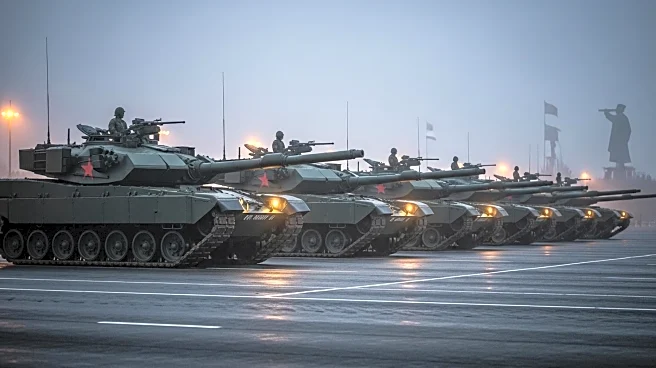What's Happening?
North Korean leader Kim Jong-un is set to visit China for the first time in over six years to attend a military parade commemorating the 80th anniversary of the end of World War II. This event, scheduled for September 3 at Beijing's Tiananmen Square, will see Kim alongside Chinese President Xi Jinping and Russian President Vladimir Putin. Analysts suggest this gathering represents a strategic realignment and a unified stance against US-led pressure. The visit has been confirmed by China's foreign ministry and North Korea's Korean Central News Agency, although details regarding the duration and itinerary remain undisclosed. Kim's participation marks his debut in a multilateral event with other heads of state, including leaders from Vietnam, Indonesia, Malaysia, Pakistan, Belarus, Iran, Serbia, Slovakia, and Central Asian nations.
Why It's Important?
Kim Jong-un's presence at the military parade alongside Xi Jinping and Vladimir Putin could indicate a strengthening of ties between China and North Korea, potentially altering geopolitical dynamics in the region. This act of unity may serve as a counterbalance to US influence and pressure, particularly in light of ongoing tensions surrounding North Korea's nuclear ambitions and China's regional policies. The event underscores the possibility of a strategic alliance that could impact US foreign policy and its approach to both nations. The participation of multiple foreign leaders further highlights the significance of this gathering in shaping international relations and alliances.
What's Next?
The implications of Kim Jong-un's visit may lead to increased diplomatic engagements between China and North Korea, potentially resulting in economic or military collaborations. Observers will be keenly watching for any announcements or agreements that may emerge from this meeting. The US and its allies may respond by reassessing their strategies in dealing with North Korea and China, possibly leading to shifts in diplomatic or military postures. The broader international community will also be monitoring the outcomes of this event to gauge its impact on regional stability and global geopolitical alignments.
Beyond the Headlines
The presence of Kim Jong-un at the parade could also have cultural and symbolic significance, reinforcing historical ties between China and North Korea. This event may serve as a reminder of shared historical experiences and mutual interests, potentially fostering a deeper cultural connection. Additionally, the gathering of leaders from various nations highlights the complex web of international relations and the role of multilateral events in shaping diplomatic narratives.









